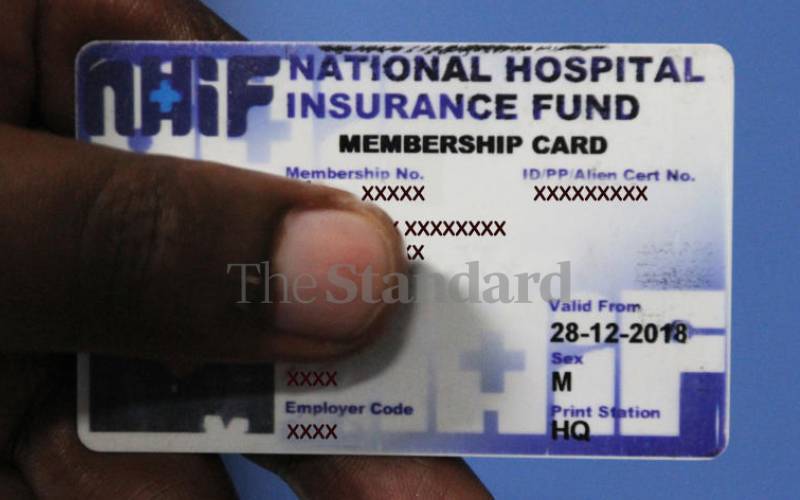
In the proposed regulation, a beneficiary with chronic illness should access treatment from public health care facilities only. [File, Standard]
Dominic Mwangi supports himself with a rope to wake up from his sickbed after he was diagnosed with prostate cancer three years ago. Mr Mwangi, 69 from Mukurwe-ini, Nyeri County depends on his 76-year-old elder sister for care.
Though he has a National Health Insurance Fund (NHIF) card, the scheme does not offer palliative care, forcing him to seek help at the Nyeri Hospice whose nurses supply him with medicine at least twice a week. They also dress his wounds besides offering spiritual and psychosocial support.
“We spend sleepless nights praying for my uncle to have him relieved of pain,” Ms Nancy Wachira, Mr Mwangi’s niece, explain. “It is worrying that his condition worsens every day.”
Controlling pain
Palliative care helps in controlling pain and other infections and “though my uncle’s condition is yet to improve much, he is positive and live comfortably,” added the niece.
Ms Eunice Nderitu, a palliative care nurse at Nyeri Hospice explained that a patient’s family members are also included in the psychological support as they’re equally affected, but laments that most families have been leaving “their loved ones under the mercy of nobody.”
Ms Nderitu added: “We guide them (families) through anticipatory grief,” she offered, “and after a patient dies we counsel the family on how to deal with grief.”
Like Mr Mwangi, the majority of terminally ill patients cannot access palliative care with NHIF as the scheme does not cater for such services.
Take Mr Eliud Wambugu, 76, for instance. He depends on relatives and friends for financial support to buy painkillers like morphine since he was diagnosed with colon cancer 30 years ago.
Mr Wambugu spends about Sh11,000 on medicine and Sh5,100 on regular check-ups every month.
He says: “The prohibitive costs of managing the disease made me join a palliative group where we mobilise well-wishers to offer medical and other psychological support.”
This has improved the quality of his life, he says.
Mr Wambugu uses colostomy bags and imported ones range from Sh800 to Sh1,000, and those supplied by Kenya Medical Supplies Authority (KEMSA) cost between Sh100 and Sh300.
“I have modified a paper bag to wear because I cannot access medicines and also buy colostomy bags,” said Mr Wambugu.
The cost of the bags went up since the outbreak of Covid-19. This alongside shortages. Nyeri Hospice Chief Executive Mr Stephen Musya says the bags are also highly taxed.
At least 150 patients at the Nyeri Hospice use colostomy bags.
Elisha Yogo, a 58-year-old police officer in Oljororok, Nyandarua County accesses palliative care at the Nakuru Hospice after surviving cancer of the colon.
Yogo, the chairperson of the cancer unit, explained that “it is not easy to manage a cancer patient, but when they meet, they encourage each other, a process that helps in healing by accepting the condition.”
Yogo said few believe he has cancer “until I show them the stoma.”
The Nakuru Hospice founder, Ms Elizabeth Ndung’u, said financial constraints is one of the biggest challenges facing patients as cancer drugs are expensive with pain relievers going for Sh20, 000 and most patients can hardly afford them on top of chemotherapy and radiotherapy session expenses.
“The government should subsidise cancer therapy services for affordability and accessibility,” pleaded Ndung’u.
Mr Musya regretted that despite the high demand for palliative care, the majority of patients don’t have health insurance and NHIF should consider including palliative services in the health scheme. especially oncology services.
Mr Muasya argues that with devolved units, counties should support palliative care centres with essential medicines, human resources and outreach programs.
As the country gears towards implementation of the Universal Health Coverage (UHC), the Kenya Hospices and Palliative Care Association (KEHPCA), has urged NHIF to consider hospices, other providers of palliation support besides the primary health care provider
Under the NHIF regulations 2022, the beneficiary of chronic illness can access treatment from public healthcare providers only and KEHPCA executive director Ms Mackuline Atieno says “hospices may not be the primary care provider but may provide supportive care while on home care” over chronic illnesses, including treatment and psychological support.
In the proposed regulation, a beneficiary with chronic illness is supposed to access treatment from public health care facilities only.
But the association argues that not all hospices in Kenya are public and according to Atieno, NHIF should reconsider special criteria for hospices that may not need all the minimum criteria based on their work.
 The Standard Group Plc is a multi-media organization with investments in media platforms spanning newspaper print
operations, television, radio broadcasting, digital and online services. The Standard Group is recognized as a
leading multi-media house in Kenya with a key influence in matters of national and international interest.
The Standard Group Plc is a multi-media organization with investments in media platforms spanning newspaper print
operations, television, radio broadcasting, digital and online services. The Standard Group is recognized as a
leading multi-media house in Kenya with a key influence in matters of national and international interest.











